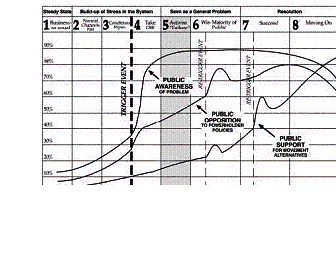|
from The Worldview Literacy Book copyright 2009 back to worldview theme(s) #35 |
| Discussion #35A: "Self Reliant Nonconformity" is about
"doing your own thing." This
latter phrase succinctly defines individualism—more formally defined
as a social philosophy and belief
system that places individual interests and rights above those of
society, and individual freedom, self-reliance and independence above
any social contract obligations. Consider
how three famous self reliant non-conformists have viewed society.
Former British Prime Minister Margaret Thatcher denied that it
existed claiming, "There is no such thing as society— only
individuals!" In his
famous 1841 essay "Self Reliance" American Ralph Waldo Emerson
critiqued it as follows. "Society everywhere is in conspiracy
against the manhood of every one of its members.
Society is a joint-stock company, in which the members agree, for
the better securing of his bread to each shareholder, to surrender the
liberty and culture of the eater. The
virtue in most request is conformity. Self-reliance is its aversion.
It loves not realities and creators, but names and
customs...Whoso would be a man, must be a non-conformist!" Finally,
consider American poet Robert Frost's line (which became his epitaph),
"I had a lover's quarrel with the world!"
Among Frost's more famous lines are "Two roads diverged in a
wood, and I—I took the one less traveled by, and that has made all the
difference." Psychiatrist
Scott Peck used The Road Less Traveled as the title of his 1978
best-selling book—about "love, traditional values, and spiritual
growth" and offered help to those seeking psychological health. With respect to the latter, self reliant non-conformists
feel they have found it: none are "Struggling With a Basic Need:
Self Esteem" (theme #41). With
respect to the former—love and growth—many such non-conformists'
lives are lived following advice Peck gives: "all life itself
represents a risk, and the more lovingly we live our lives the more
risks we take...The only real security in life lies in relishing life's
insecurity...The highest forms of love are inevitably totally free
choices and not acts of conformity."
In doing their own thing, self reliant non-conformists seldom go
along with the crowd—unlike those who follow "The Collective
Cognitive Imperative" (theme #15).
As Emerson put it, "the great man is he who in the midst of
the crowd keeps with perfect sweetness the independence of
solitude." The insecure will avoid stepping out of line so as not to
stand out, fearing he or she will have to explain such action. In
response, in "Self Reliance" Emerson wrote, "Your
genuine action will explain itself...Your conformity explains
nothing."
#35B: Those
dissatisfied with things as they are—the status quo—may turn to
"Working for Change." The
degree of their dissatisfaction, the amount of the perceived gap between
how things should be and how they are, and the extent to which they
believe in the rightness of their cause (see theme #2A), all determine
the strength of their
commitment to pursuing |
Discussion—continued change. Some
work for change out of self interest since what they are seeking will
dramatically improve their own lives. Others, perhaps possessing a great
sense of social justice, do so more altruistically.
An especially idealistic or particularly desperate few—the
latter perhaps feeling they have nothing to lose—will sacrifice
everything, even their lives, in fighting entrenched forces who want to keep things as they are.
Figure #20a depicts two approaches for
bringing change: top down vs. bottom up.
Those working for change may be characterized as activists (of
various types including civil rights, consumer, environmental,
political, social, etc), giraffes, lobbyists, organizers, progressives,
rebels, reformers, revolutionaries, freedom fighters, terrorists (see
Figure #35a), or whistle blowers. Many
are populists (see Discussion, theme #21A) seeking to build a grassroots
movement which begins with community organizing.
(See Figure #21b.) According
to Bill Moyer (Figure #35b), successful social movements go through
eight stages. Often aided
by some triggering event that dramatically raises public awareness of
the problem and movement, eventually it triumphs over the powers that
be. Beyond community organizing, other
tactics employed may include political campaigning, filing lawsuits
(including class action suits), civil disobedience, non-violent protest,
strikes, boycotts, seeking affirmative action, submitting to arbitration
or mediation, public relations or propaganda campaigns, lobbying,
bombings, taking hostages, etc. If
the action breaks laws or is directed against the government then the
latter may respond with police action dispersing crowds, making arrests,
curfews, various tactics to divide those who have united, new laws, new
elections, military action, etc. The battle between those "Valuing
Traditions" (theme #34) and those "Working for Change"
(theme #35) need not erupt into conflict—instead conservative vs.
liberal debate can constructively shape public action. Figure #35a
Born in 1947
in Ramallah, in what was then Palestine, Farouk was one of millions
uprooted by the war accompanying the founding of Israel in 1948. Growing up a
stateless refugee, traveling from one country to another, he finally
settled in New York City in the 1970s.
After many years working as a political activist on behalf of
Palestinian rights, in April 2002 he began hosting a radio program
featuring interviews with Palestinians living in Israeli occupied areas.
While doing that, NYC police and INS officers raided his apartment,
entering without a warrant looking for weapons and explosives.
Detained in late April 2002, subjected to extensive interrogation
and often denied food, Farouk spent two years in various jails, his
health deteriorating. Even while being taken to health clinics he was
kept handcuffed and shackled. Finally
released in April 2004,
Farouk died three months later. He
was never charged with a crime. |
|
||||

